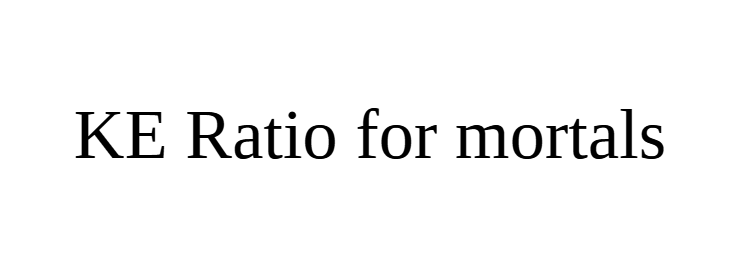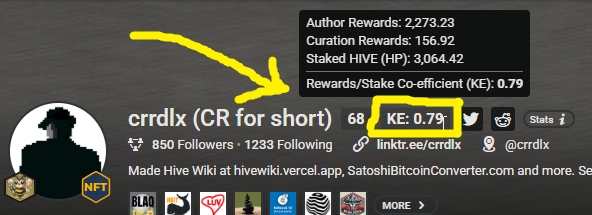
If you're like me, you noticed the KE score shown on PeakD.com and wondered, "What's that?" Maybe my scanner has been on the fritz, but this KE had not been appearing on my radar until, well, blip!, there it was.

"What's that?" I wondered. A mouseover gives details, but still, I wondered, "Okay, so what's that?"
After doing a little looking around, I'll try here to relay what I understand about the KE Coefficient.
KE Basics
- KE stands for the Krampus Co-Efficient
- I had to look up what Krampus was. Krampus is a demon figure who supposedly travels with St. Nicholas. St. Nick rewards good children, Krampus deals justice to naughty children.
- KE is also called the KE Ratio
- It got started by @azircon with this post in August 2024. Azircon recently wrote this follow-up in May 2025.
- KE sets out to be a naughty/nice score on Hive.
- A lower KE is "better" than a high KE.
- It has to do with how much a Hive user is staking/saving vs. how much the user is withdrawing. In other words, it's a number to reflect if the Hive user is "putting in" or "taking out" from Hive.
- A KE above 1.0 is naughty - the user is withdrawing more than putting in.
- A KE below 1.0 is nice - the user is putting in more than taking out.
- The math is objective, the interpreation is subjective, but Azircon suggests less than 3.0 is in the "okay" range, above 3.0 gets into the naughty range. See the handy chart on this page.
Understand, in my view, we should be cautious about applying judgment while using this score. Frankly, applying "naughty" and "nice" is not good as that's applying the subjective to raw, objective numbers. People have different reasons for doing what they do with funds, and in my view, that's completely their call. Still, the number is what the number is.
It's like Reputation, sorta
On Hive we're familiar with a Reputation score because it's omnipresent.
PeakD shows it right beside my avatar image above, Ecency and Hive.blog do as well, below.


I appreciate this easy to view Rep score. At a glance, I can get a general sense of the Hive user. Whenever I look at a different platform, I miss this. I might be interacting with a foundational person on the platform or a total crackpot. Reputation scores on Hive help me quickly figure what I'm dealing with. It's not perfect, but I like the handiness. By the way, Azircon talks about Reputation on his post.
Game theory - a side note
I love that Azircon embedded the John Nash clip from "A Beautiful Mind" about governing dynamics in the post above. As I read through this KE ratio stuff, it immediately gave rise in my mind to game theory and particularly social traps and the Nash Equilibrium.
There is a game or test in this field called the Nuts Game. People sit around a table. In the middle is a bowl of nuts. You go around the table, person 1 draws out as many nuts as desired. Person 2 does the same, then 3, 4, etc. At the end of the round, everyone has a score of collected nuts. But, the trick is, whatever remains in the bowl at the end of the round is doubled. Think of it like fishing. If some fish are left, they can spawn and regenerate the population.
After the population is doubled at the round's end, a new round begins. In this way, the game can go on forever. Unless, of course, the people get greedy or selfish and draw out the last remaining nut(s). Then, it is over.
This is what the "governing dynamics" scene is all about. They question Adam Smith's notion of a rational man acting rationally...if given the chance to take all the nuts, a rational person will take them, and should, because that's in his own best interest. John Nash, with his governing dynamics and equilibrium, showed and proved mathematically that, No, actually it's in one's best interest to not do that. Instead, it's best to regulate one's behavior and therefore perpetuate the rewards...you'll eventually get more by keeping it going.
In social traps, though, there are other dynamics. For instance, there are "freeriders" and there are also personality trait differences at play here.
There have been interesting studies where the bad results of social traps have tried to be mitigated. It's hard to do.
The method of "regulation" is one route: this is a hard-and-fast rule from an authority. This is like a law from above. For Hive, this would be like a hard-coded rule about staking/unstaking, withdrawing, etc. which would make pilfering Hive rewards (and getting a very high KE Ratio) impossible because the code disallows it. I don't see this happening in Hive. And, truth be told, in real life this "regulation" route has proven to be (a) hard to implement and (b) inefficient even if it is implemented. (Inefficient, in this case, meaning we get results, but we could be getting so much more.)
Or, a second method in trying to mitigate social traps is by assessing the Big Five personality trait of "agreeableness". One of the subdivisions of "agreeableness" is "cooperation." Cooperation is, of course, getting along with and working with others. Unsurprisingly, people who score high in agreeableness on personality inventories tend to "do well" in tests like the Nuts Game. People who score low in agreeableness do not do well in the Nuts Game. More precisely, low agreeableness people "do well" by taking all of the nuts for themselves, but then they're done. They, quite literally, ruin it for everyone. And, they could have had more over time had they cooperated with the others.
And, a third method to mitigate social traps is through community norms or policing. This seems to have been proven as the most effective way to deal with these tricky social traps. The clearest example to me is the lobster fisheries of Maine. They know that taking some lobsters, but not all, is the best way to manage the population, keep it healthy, and still make a living lobstering. And to that end, the local community monitors the lobster waters themselves. You simply do not, as an outsider, launch a boat in the harbor and start harvesting lobsters en masse. The local will have a word with you!
This community-approach seems to be the route that Hive is taking with KE Ratio by making it publicly viewable to all. This is good.

I go by @crrdlx or "CR" for short. See all my links or contact info at https://linktr.ee/crrdlx.
Thanks for the explanation
Many thanks for the explainer. I had no idea what the KE score was and what it meant. I feel better informed, but still not clear on why this is necessary. It would seem that this would negatively impact folks who spend their hard earned Hive/HBD using tools like the V4Vapp or the new Hive debit card. Or does that not factor into the equation? If this is for reputation, it seems odd given we all already have a reputation score. Perhaps the significance or value of this ranking is simply lost on me.
I'm learning myself. I think spending does not matter, but the conversion or unstaking. As far as reputation, it's helpful but not perfect at all.
Conversion of Hive to HBD or conversion to savings for both Hive and HBD? Or is it more for things like powering up Hive?
I can understand the negative impact of unstaking or powering down to the overall community if it were done at a mass scale. I also know that there are folks who are making some or perhaps maybe all of their living on their content. Hive then becomes their entrepreneurial side hustle or perhaps even their full time business.
I most definitely want Hive to be a robust chain that has folks who are not in this for a "get rich quick" scheme. I personally haven't encountered those kinds of folks. Everyone I've met or connected with is committed to the health and longevity of Hive.
Not sure about the Hive to HBD conversion to savings. I would think that would actually be strong for the ecosystem and KE score, but I don't know. Pretty sure it is about HP though.
I think like most things, it will prove itself out over time. Again, thanks for the explainer post.
If you spend all your earned HBD, you would end up at a KE of 2, right? But some have a score of 20 and more, even 2000! So they repeatedly powered down and sold all earned Hive. Why I should upvote them when I could upvote also users who don´t sell out?
I think the fact we can all choose what sort of content and creators we want to or do not want to curate certainly speaks to your point. I agree that if there are more people here who only want to game the system and get what they can out of it without investing or adding value, is not a good thing at all.
Which is one of the many reason I am grateful for all the dedicated developers, creators, and curators who day in an day out are committed to a healthy, growing, and sustainable Hive.
@crrdlx, I paid out 0.118 HIVE and 0.029 HBD to reward 2 comments in this discussion thread.